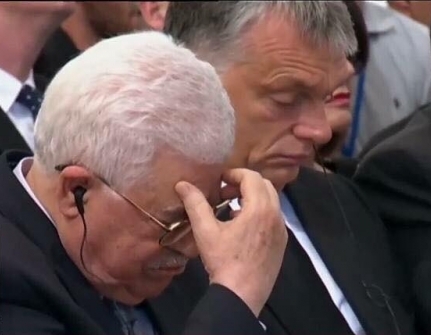
Tears for the enemy? Palestinian president Mahmud Abbas seems to be holding back tears at the funeral of former Israeli president Shimon Peres, September 30, 2016. Photo i24news
WHEN a senior Johannesburg rabbi this week eulogised the late former Israeli president Shimon Peres for successfully mediating in his lifetime between the opposite poles of political realism involving military force, and resolute belief in the possibility of Israeli-Palestinian peace, he remarked that it is now 40 years since the 1976 Entebbe raid where Israeli commandos flew 4000 km to rescue Israeli hostages at Uganda’s airport.
They were being held there by the Popular Front for the Liberation of Palestine, which had hijacked an airliner bound for Paris and diverted it to Entebbe. Peres played an important role behind the scenes in approving the commando raid, which some army people thought was so risky that it was doomed to end catastrophically.
But this only gives a tiny glimpse into the anguished history of that region. Indeed, Israel and Palestine – just like historical South Africa – have been in a desperate quest for peace for many decades.
Numerous religious leaders from different faiths in South Africa have taken sides over the years on the Israeli-Palestinian conundrum. Archbishop emeritus Desmond Tutu, for example, has been harshly critical of Israel for its treatment of the Palestinians. Other Christian leaders such as Rev Kenneth Meshoe, leader of the African Christian Democratic Party, defend Israel vigorously, saying its security needs have left it no choice but to maintain control over the Palestinian territories. Muslim clerics for the most part support the Palestinian viewpoint.
The rabbi’s comments came during his sermon at a large Johannesburg synagogue for the Jewish New Year, which is traditionally seen as a time of taking stock and making new beginnings.
It is an astonishing fact that in nine months’ time it will be 50 years – half a century! – that Israelis and Palestinians have existed in an occupier/occupied relationship in the West Bank and Gaza. Several generations of Palestinians and Israelis have lived their entire lives in this reality, for which both sides are blameable, each pointing the finger at the other. Ending this deadlock with an independent Palestinian state living in peace alongside Israel is a dream Peres – who died last month – did not see fulfilled, despite tireless engagement with leaders in the conflict including Israelis, Palestinians, Americans, Arabs and others. One notable person at his funeral was Palestinian president, Mahmud Abbas, who was criticised by other Palestinian leaders for being there.
In the 1967 Six Day War Jewish volunteers from all over the world – including South Africa – flocked to Israel to help defeat the combined Arab countries’ attempt to destroy it. The war, which Israel won in six days, resulted in Israel taking over the West Bank and Gaza from Jordanian and Egyptian control respectively, and holding onto them for its security needs. Later, Jewish settlements proliferated there, making a complicated situation even more complicated.
What Israel and these idealistic Diaspora Jewish volunteers never envisaged is that 50 years after that war, there would still be no genuine peace with the Palestinians and Arab world. Even Egypt, after nearly four decades of formal peace, still harbours in its society a deep hatred for Israel.
In 2003 Peres told a Jewish audience at Johannesburg’s Linder Auditorium that when he was younger, he used to believe Israel would end its problems with the Palestinians and Arab world long before South Africa solved its problems – that the South African situation under apartheid was so intractable, it could only result in an extended racial bloodbath into the foreseeable future.
Contrary to his view, South Africa is now a stable democracy, notwithstanding rumblings making it wobble ominously from time to time. Despite the ineptitude and corruption characterising its first two decades of democracy, basic democratic institutions are intact, such as an independent judiciary and free press. Student protests currently taking place at universities for fee-free higher education are expressions of these democratic liberties, even if disturbing, violent excesses sometimes occur from both sides, including students and law enforcement agencies.
Yet the Israeli-Palestinian conflict rages on, with peace-dreamers seeming like Sisyphus rolling a boulder up a hill which always falls down again. Most countries and people, including the majority of Israelis and Jews worldwide, accept that the only viable answer is the two-state solution. This includes South Africa, which maintains full diplomatic relations with Israel and cooperation with its ambassador, as well as welcoming a Palestinian ambassador.
Going back to the rabbi’s New Year message of hope: Is it possible that before reaching a full half-century of deadlock over control of the Palestinian territories there can be a turn towards a new reality? That rabbis will be able to celebrate not only “miraculous” events like the Six Day War victory and the Entebbe rescue, but also an end to the corrosive yoke both sides carry by being occupier and occupied?
Given current world events, it is clear progress does not depend only on Israelis and Palestinians. The Syrian mayhem, rise of ISIS-inspired terrorism, the buffoon Donald Trump potentially becoming leader of the world’s most powerful nation, and other bizarre developments are just some.
But if religious leaders can influence the goals their followers strive for, Israeli-Palestinian peace before the half-century is reached would be a worthy one.
(Geoff Sifrin is a journalist based in Johannesburg, South Africa, and former Editor of the SA Jewish Report. Email: geoffs@icon.co.za)